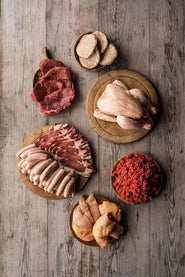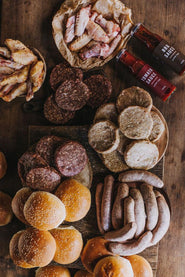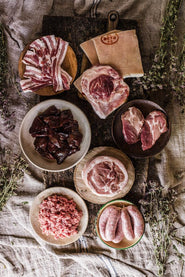Freezing is the ultimate natural food preservative. When compared to the questionable environmental and health impacts of loading fresh food with artificial preservatives, its simplicity is spectacularly undervalued; your freezer needs nothing else for it to work its magic. Yet frozen food has a bit of a PR problem, and while it is not entirely undeserved, here are a few facts about freezing meat to get you falling in love with its gentle hum.
1. It’s all about the crystals
When you freeze any kind of food, the water content moves from a liquid to an ice state. Ice crystals take up more volume than liquid water, and one of the rules of physics dictates that the more slowly an item of food freezes, the bigger the ice crystals that form. This becomes an issue with fresh whole foods as once the ice crystals get bigger than the cell size of the vegetable, fruit or meat, cell structure is destroyed. Essentially it is popped like a balloon and this bring the mushiness and flavour impact that gave frozen food its bad rep in the past. But things have moved on since then…
2. Slowly grown but not slowly frozen
Freezing technology has improved massively since the mushy era, most notably with the advent of blast freezing. This is essentially an extra-cold freezer, usually fan-powered to circulate the freezing air, which rapidly drops the temperature of food. As we’ve already learned, this produces much small ice crystals which don’t disrupt the structure of the food, therefore safeguarding the flavour and texture. This is exactly the type of freezer we use at Pipers Farm, so our beautiful slowly reared native breed meat is rapidly frozen. Once it has been frozen this way you can move it to a domestic freezer without the ice crystals reverting to a larger, food damaging size. And because we carefully hang all of our meat, making it tender and intensifying flavour by removing up to 30% of water, there are fewer water molecules present to have a damaging impact anyway.
3. The goodness is just as good
It has been proven that freezing meat (and fruit and veg for that matter) has little to no impact on the nutrients naturally present. We never add any nasty preservatives or chemicals to our meat; we don't want to eat them so why should we make you? We don't 'gas flush' or do anything else nasty or unnatural either, though this can be common practice elsewhere in the food industry. Just like harvesting peas at the perfect moment, or fish from our seas, creating the perfect eating sensation for our meat is no different. We spend months and years rearing our livestock to reach peak condition, and that is exactly how we want you to enjoy it. Simply put, in order to make sure our meat arrives with plenty of time for you to enjoy it, we believe freezing to be the purest and healthiest way to store it.
4. Forget the overnight defrost
Part of our approach to sustainable meat production is making life in the kitchen for you as easy as possible. It is for this reason that we developed our pouch approach to packaging our meat, as each recyclable plastic slip reduces freezer-to-table time from hours to minutes. All you have to do is place what you want to eat in a bowl of cool water, and you’ll have your kitchen a-sizzling in no time. The flatter the meat, the faster the defrost, so expect mince and steaks to move faster than chicken joints for example. Minute steaks are especially speedy – we’ve had them in the table from frozen in just 25 minutes! Having said that, if it’s a whole joint for a roast dinner, you will need to get it out overnight.
5. Fear not the defrosted sausage delivery
Our fully recyclable boxes are lined with natural wool insulation, and kept chilled with reusable ice packs, but sometimes deliveries will arrive partly defrosted. We get a few calls from alarmed customers when this happens as standard practice is to regard defrosted meat as potentially dangerous. You don’t need to worry about this with Pipers Farm meat, as our way of farming does not create conditions for nasty bugs to thrive in the same way that intensive farming does. The nasties just aren’t there in the first place, as we control everything from farm, to butchery to your table.
6. Don’t burn baby burn
Freezer burn occurs when a part of the food is left exposed to air, causing it to dehydrate and oxidise. This impacts the flavour and texture of the meat as essentially it has dried out, which also destroys cellular structure. To avoid this happening, make sure all your meat is wrapped up carefully. Pipers Farm meat comes in those handy pouches as already explained, so freezer burn should not be an issue.
Our meat boxes are really easy way to get your freezer full with delicious, grass fed meat reared the natural way. Take a look at the collection here.






